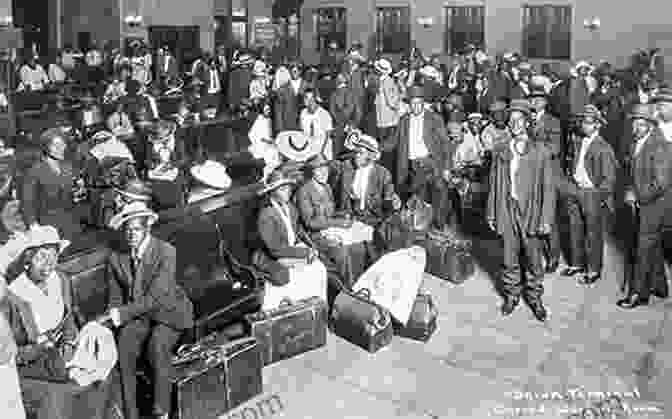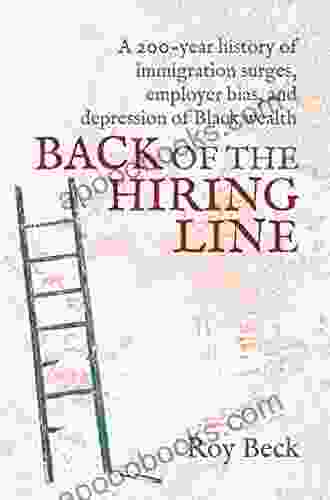Unveiling the Interplay: Immigration, Employer Bias, and the Economic Plight of Black Americans

A Comprehensive Examination of a 200-Year History

4.9 out of 5
| Language | : | English |
| File size | : | 3036 KB |
| Text-to-Speech | : | Enabled |
| Screen Reader | : | Supported |
| Enhanced typesetting | : | Enabled |
| Word Wise | : | Enabled |
| Print length | : | 344 pages |
| Lending | : | Enabled |
The United States has witnessed a continuous influx of immigrants throughout its history. From the arrival of the first European settlers to the present day, immigration has been a defining characteristic of American society. However, the impact of immigration on Black Americans has been a complex and often contentious issue.
For over 200 years, the arrival of immigrants has coincided with periods of economic turmoil and increased competition for jobs. This has led to heightened tensions between Black Americans and immigrants, particularly during times of economic depression. The perception that immigrants are taking jobs away from Black workers has fueled resentment and discrimination.
In this article, we will explore the long and intricate relationship between immigration, employer bias, and the economic plight of Black Americans. We will examine historical evidence, analyze sociological studies, and present a comprehensive overview of this multifaceted issue.
The Early Years: Slavery and Immigration
The history of immigration in the United States cannot be separated from the history of slavery. From the 16th to the 19th centuries, millions of Africans were forcibly brought to the Americas as slaves. The presence of a large enslaved population had a profound impact on the economy and the social fabric of the United States.
As the industrial revolution took hold in the late 19th century, a new wave of immigrants from Europe and Asia arrived in the United States. These immigrants often competed with Black workers for jobs in factories and other industries. The resulting economic competition contributed to racial tensions and discrimination.
The Great Depression: A Turning Point
The Great Depression of the 1930s marked a turning point in the relationship between immigration, employer bias, and Black economic inequality. As the economy collapsed, unemployment rates soared, and competition for jobs intensified.
In this climate of economic crisis, many Black workers blamed immigrants for their job losses. This led to increased discrimination against immigrants, both from employers and the general population. Employers often preferred to hire white Americans, even if they were less qualified than immigrant workers.
Post-World War II: Immigration and Economic Growth
After World War II, the United States experienced a period of economic growth and prosperity. This growth was fueled in part by the arrival of new immigrants, many of whom came from Asia and Latin America.
However, the economic benefits of immigration were not evenly distributed. Black workers continued to face discrimination in the labor market. Employers often hired Black workers into lower-paying jobs or relegated them to less desirable positions.
Contemporary Trends: A Complex Landscape
In recent decades, the United States has experienced another wave of immigration, with the majority of immigrants coming from Latin America and Asia. This has again led to increased competition for jobs and concerns about the impact of immigration on Black employment.
While there is evidence to suggest that immigration has a negative impact on the wages of Black workers in some industries, other studies have found that the overall impact is negligible. The relationship between immigration and Black economic inequality is complex and multifaceted.
Employer Bias: A Persistent Problem
Throughout the history of immigration in the United States, employer bias has been a persistent problem. Employers often discriminate against Black workers in hiring, promotion, and other employment-related matters.
This bias is often unconscious and may not be intentional. However, its effects are real and can limit the economic opportunities for Black Americans. Employers need to be aware of their own biases and take steps to eliminate them from the workplace.
Policy Implications
The issue of immigration, employer bias, and Black economic inequality is complex and requires a multifaceted approach.
First, it is important to address the root causes of employer bias. This can be done through education, training, and the enforcement of anti-discrimination laws.
Second, it is important to ensure that immigrants have equal access to education and job training programs. This will help them to compete in the labor market and reduce their reliance on low-paying jobs.
Finally, it is important to have a comprehensive immigration policy that strikes a balance between the need for skilled workers and the concerns of Black Americans. This policy should include measures to prevent discrimination against both immigrants and Black workers.
The relationship between immigration, employer bias, and the economic plight of Black Americans is a long and complex one. While immigration has often contributed to increased competition for jobs and discrimination, it has also been a source of economic growth and social diversity.
Ultimately, it is up to policymakers, employers, and all Americans to work together to create a society in which everyone has an equal opportunity to succeed.
4.9 out of 5
| Language | : | English |
| File size | : | 3036 KB |
| Text-to-Speech | : | Enabled |
| Screen Reader | : | Supported |
| Enhanced typesetting | : | Enabled |
| Word Wise | : | Enabled |
| Print length | : | 344 pages |
| Lending | : | Enabled |
Do you want to contribute by writing guest posts on this blog?
Please contact us and send us a resume of previous articles that you have written.
 Book
Book Novel
Novel Page
Page Chapter
Chapter Text
Text Story
Story Genre
Genre Reader
Reader Library
Library Paperback
Paperback E-book
E-book Magazine
Magazine Newspaper
Newspaper Paragraph
Paragraph Sentence
Sentence Bookmark
Bookmark Shelf
Shelf Glossary
Glossary Bibliography
Bibliography Foreword
Foreword Preface
Preface Synopsis
Synopsis Annotation
Annotation Footnote
Footnote Manuscript
Manuscript Scroll
Scroll Codex
Codex Tome
Tome Bestseller
Bestseller Classics
Classics Library card
Library card Narrative
Narrative Biography
Biography Autobiography
Autobiography Memoir
Memoir Reference
Reference Encyclopedia
Encyclopedia Tj Jefferson
Tj Jefferson Susan Mallery
Susan Mallery Sylvia Plath
Sylvia Plath Mark Ribowsky
Mark Ribowsky Stormzy
Stormzy Simone M Jelks
Simone M Jelks Ludwig Fulda
Ludwig Fulda Pavel Ythjall
Pavel Ythjall Linda Lael Miller
Linda Lael Miller Zapien Maxwell
Zapien Maxwell Jessie Ash
Jessie Ash Tina Rasalla
Tina Rasalla Tom Young
Tom Young Stefan Baron
Stefan Baron Susan Guagliumi
Susan Guagliumi Sean Frazier
Sean Frazier Raymond Ibrahim
Raymond Ibrahim J Poolos
J Poolos Vladimir Kovalevsky
Vladimir Kovalevsky Tamsyn Muir
Tamsyn Muir
Light bulbAdvertise smarter! Our strategic ad space ensures maximum exposure. Reserve your spot today!

 Boris PasternakUnveiling the Supernatural: Tales of Hauntings, Strange Happenings, and Local...
Boris PasternakUnveiling the Supernatural: Tales of Hauntings, Strange Happenings, and Local...
 Robert Louis StevensonMythic Character Arcs Through the 12 Film Epic: A Journey of Transformation
Robert Louis StevensonMythic Character Arcs Through the 12 Film Epic: A Journey of Transformation Neil GaimanFollow ·18k
Neil GaimanFollow ·18k Kevin TurnerFollow ·7.1k
Kevin TurnerFollow ·7.1k Corey GreenFollow ·18.9k
Corey GreenFollow ·18.9k Aaron BrooksFollow ·11.7k
Aaron BrooksFollow ·11.7k Dan BellFollow ·14k
Dan BellFollow ·14k D'Angelo CarterFollow ·13.9k
D'Angelo CarterFollow ·13.9k Liam WardFollow ·15.4k
Liam WardFollow ·15.4k Henry GreenFollow ·16k
Henry GreenFollow ·16k

 Harry Cook
Harry CookRape Blossoms and White Sky: A Floral Symphony of...
A Kaleidoscope of Colors...

 Vic Parker
Vic ParkerThe Passion of Jovita Fuentes: Unveiling the...
Immerse yourself in the...

 Cormac McCarthy
Cormac McCarthySinners and Saints: A Dark New Adult High School Bully...
Sinners and Saints is...
4.9 out of 5
| Language | : | English |
| File size | : | 3036 KB |
| Text-to-Speech | : | Enabled |
| Screen Reader | : | Supported |
| Enhanced typesetting | : | Enabled |
| Word Wise | : | Enabled |
| Print length | : | 344 pages |
| Lending | : | Enabled |














